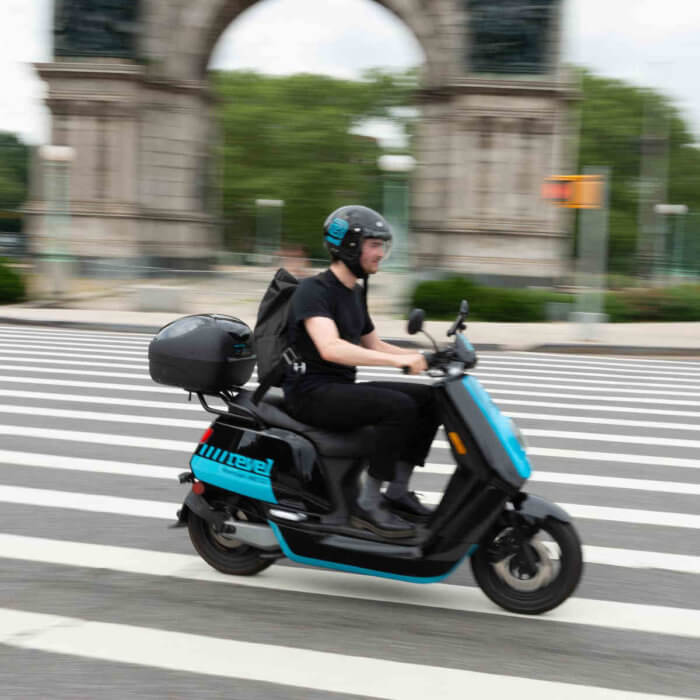Electric vehicle startup Revel will build five new “superhubs” across New York City for EV charging in the coming years, the company announced on Monday.
The company plans to bring 136 new fast-charging stalls at locations in four boroughs: two in Brooklyn, and one each in the Bronx, Manhattan, and Queens. The charging ports will be available to use 24/7 by any electric motor vehicle, and can produce a full charge in ten to twenty minutes.
With the new spots plus its existing 25-slot hub in Bedford-Stuyvesant, Brooklyn, Revel says it will operate 80% of the fast-charging infrastructure in the five boroughs.
“The only way mass EV adoption will ever happen in New York City is if the charging infrastructure is there to support it,” said Revel CEO Frank Reig in a statement. “We need high-volume, public sites in the neighborhoods where people actually live and work, and that’s exactly what Revel is delivering with our growing Superhub network. This is the biggest fast charging expansion our city has ever seen, and it’s a huge step toward making our EV transition a reality.”
The largest new site will be in Maspeth, Queens, where the company plans to build a 60-unit superhub at the corner of 54th Road and 46th Street. That hub, sited in an industrial area and intended primarily for commercial EVs, will be “the largest public, universally accessible fast charging station in the Western Hemisphere,” the company said in a press release.
The company also plans a 30-port hub in the South Bronx at East 139th Street and Bruckner Boulevard, adjacent to the Bruckner Expressway and sandwiched between gas stations run by BP and Citgo.
In Brooklyn, the company intends to open a 20-slot hub on Red Hook’s industrial waterfront — funded by a $7 million state grant that will also go towards building a green jobs training center — and 16 units at its new headquarters at Williamsburg’s Dime Building, near the Williamsburg Bridge and the neighborhood’s MTA bus terminal. And in Manhattan, 10 units will open at Pier 36, adjacent to the FDR Drive.
All the sites are expected to open by the end of 2023, the company says, except the Red Hook spot which will open the following year. The selected sites will not require any rezonings for the hubs, confirmed Revel spokesperson Robert Familiar, and thus will avoid the city’s drawn-out and costly Uniform Land Use Review Procedure (ULURP).
“Making fast, reliable electric vehicle charging accessible across New York City’s five boroughs is at the foundation of reducing emissions in our city,” said Deputy Mayor Meera Joshi in a statement. “We applaud Revel’s infrastructure investment in New York City, which will make it easier for drivers to go electric.”
The Adams administration has leaned heavily on investment in EVs and related infrastructure; Revel’s announcement comes just days after Mayor Eric Adams announced the city would replace more than 900 gas-guzzling city vehicles with clean EVs. With the exception of Red Hook, the hubs are being privately financed; the company received $176 million in backing last year from a group of investors led by financial giant BlackRock to build out its charging network.

Revel has quickly become one of the biggest players in the city’s EV sector. The company got its start in the Big Apple with its moped-sharing program, launching in 2018 and quickly peppering the city with its distinctive blue mopeds, which users can unlock with their smartphone and park anywhere they want.
Despite its origins, however, the five new hubs will not host charging infrastructure for electric bikes or scooters, confirmed Familiar, the Revel spokesperson; Revel charges its mopeds offsite.
In 2021, Revel announced plans for its first charging superhub in Bed-Stuy at a former Pfizer pharmaceutical plant, opening within months. Later that year, the company announced plans to break into the city’s cab market with a fleet of Tesla Model Ys painted in its signature blue.
But that plan encountered bureaucratic snags when the city attempted to put the kibosh on the enterprise, with the Taxi & Limousine Commission voting to amend the Big Apple’s cap on for-hire vehicles to include EVs, hoping to prevent a flood of new rideshare cars adding to the city’s paralyzing gridlock.
After weeks of squabbling, the city green-lit Revel’s foray into the FHV market, and the company now employs 480 drivers operating 200 rideshare vehicles, which will make significant use of its charging ports.





